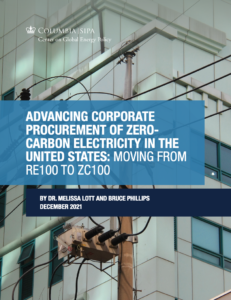Full Title: Advancing Corporate Procurement of Zero-Carbon Electricity in the United States: Moving from RE100 to ZC100
Author(s): Dr. Melissa C. Lott, Bruce Phillips
Publisher(s): Columbia Center for Global Energy Policy
Publication Date: December 8, 2021
Full Text: Download Resource
Description (excerpt):
Corporate pledges to purchase renewable electricity have led to significant new solar and wind capacity investments and driven down the carbon intensity of the power sector in the United States. Participating companies have increasingly procured this power, many with a goal of procuring quantities that are equal or proportional to the amount of electricity that they consume at their facilities on an annual basis. Corporate buyers can reap many benefits from renewables procurement, including hedging against power price fluctuations and enjoying positive brand association, helping them meet shareholder demands around climate or other environmental, social, and governance (ESG) goals. However, the reality is that commitments to buy 100 percent renewable electricity may not equate to a company actually reducing its power carbon footprint to zero.
This report from Columbia University’s Center on Global Energy Policy quantifies the mismatch between companies’ contracted variable renewable electricity (VRE) and their actual use of electricity to highlight the degree to which these companies still rely on a partially fossil-fueled power grid to bridge the gap. A modeling exercise and analysis done in collaboration with The NorthBridge Group reveals a significant shortfall between electricity demand and VRE supply, leaving companies that contract for 100 percent renewables to in fact draw between 20 percent and 50 percent of their annual electricity from the regional electric grid, depending on their location, demand profile, and mix of contracted renewable supplies.
